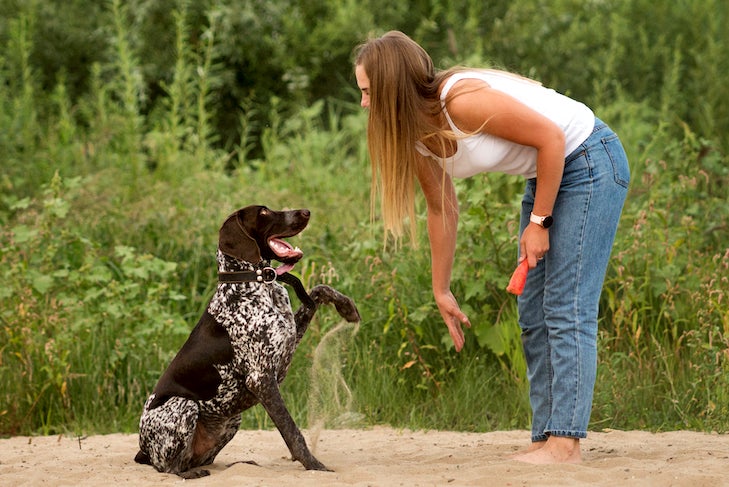Why Consistent Dog Training Is Key to a Happy Pet
Why Consistent Dog Training Is Key to a Happy Pet
Blog Article
The Ultimate Overview to Pet Dog Training: Change Your Pet dog's Actions
Reliable pet training is essential for fostering a harmonious relationship between animals and their owners. This guide not just intends to outfit you with the needed devices to transform your canine's habits but also welcomes you to discover just how these fundamental principles can lead to a deeper connection with your family pet.
Comprehending Canine Behavior
Comprehending canine actions is necessary for effective training and an unified relationship in between dogs and their owners. A pet's habits is affected by a combination of genetics, setting, and experiences. Dog training. Recognizing these variables allows owners to customize their training approaches to meet the private demands of their animals
Pet dogs communicate mainly via body language, vocalizations, and faces. A wagging tail can suggest enjoyment or joy, while a put tail might signify fear or submission. Observing these hints allows proprietors to react appropriately, reinforcing positive habits and resolving negative ones efficiently.
In addition, recognizing the social framework of pet dogs can offer insights right into their habits. Canines are pack animals, and they thrive in an organized atmosphere. Establishing clear borders and constant rules can prevent complication and promote a sense of security.
In addition, acknowledging the natural reactions of canines, such as the urge to go after or dig, is crucial. These reactions can be redirected via proper outlets, such as play or workout. By comprehensively recognizing these behavioral facets, owners can cultivate a positive training experience, eventually leading to a obedient and well-adjusted canine buddy.
Essential Training Strategies
Effective pet dog training counts on a range of essential methods that can significantly improve the understanding process for both the owner and the canine. One essential technique declares reinforcement, which includes rewarding desirable habits with deals with, praise, or play. This technique urges pets to repeat the actions that bring about positive results, fostering a relying on connection between the animal and proprietor.
One more secret technique is uniformity in expectations and commands. Utilizing the exact same verbal hints and hand signals aids the pet understand what is needed, lowering complication and advertising quicker learning. Additionally, establishing clear boundaries and guidelines is important for efficient interaction.
Socialization is likewise a necessary part of training. Revealing pet dogs to various atmospheres, people, and other animals helps them develop appropriate social abilities and reduces anxiety in unfamiliar scenarios.
Finally, persistence and timing are vital. Educating sessions ought to be quick yet frequent, making certain that the pet dog stays involved and responsive. By employing these necessary strategies, proprietors can create a favorable and organized training experience that advertises etiquette and reinforces the bond with their canine companions.
Producing an Educating Schedule
Just how can a well-structured training routine enhance a pet dog's knowing experience? A training schedule supplies consistency, making sure that canines obtain routine, concentrated direction. This predictability aids canines recognize what is expected of them, enhancing their knowing and permitting much better retention of habits and commands.
When developing a training schedule, it is important to consider the pet dog's age, type, and private personality. Young puppies might take advantage of shorter, more constant sessions, while adult canines might flourish with longer, less constant training durations. Incorporating a range of tasks can also keep the sessions engaging, stopping monotony and advertising enthusiasm for knowing.
Furthermore, organizing training sessions at details times of the day can help solidify a routine. For example, coupling training with day-to-day strolls or playtime can create a positive association with knowing. It is likewise vital to consist of time for support, such as deals with or appreciation, to award preferred habits immediately.
Finally, versatility is essential. While consistency is important, being adaptable to the dog's state of mind or power degree can improve their knowing experience. A well-crafted training schedule ultimately lays the foundation for reliable interaction and a stronger bond between the dog and proprietor.
Typical Training Challenges
Regardless of having a well-structured training timetable, pet dog owners frequently encounter numerous obstacles visit their website during the training process. One usual problem is inconsistency in commands and signs. When multiple household participants use various terms or tones, a pet dog may come to be baffled, hindering its capacity to discover effectively.
One more frequent obstacle is interruption. Dog training. Dogs are normally interested creatures, and external stimuli such as various other animals, sounds, or people can divert their focus during training sessions. This calls for owners to produce a regulated atmosphere or progressively introduce disturbances to reinforce emphasis
Additionally, varying energy levels can influence training outcomes. High-energy pet dogs might have a hard time to resolve down and concentrate, while extra laid-back breeds could need extra inspiration to involve. Tailoring the training technique to fit the specific dog's character is crucial for success.

Structure a Strong Bond
A solid bond in between a dog and its proprietor is important for effective training and general well-being. Dog training. This partnership cultivates trust fund, which is critical for efficient communication during the training procedure. When a pet really feels linked and safe and secure to its owner, it is most likely to respond positively to hints and commands
To construct this bond, consistency is essential. Establishing a regimen that includes regular feeding, workout, and training sessions helps develop a feeling of security. Additionally, positive support strategies, such as deals with, praise, and play, reinforce preferred habits while strengthening the psychological connection.
Socialization is one more crucial element of bond-building. Revealing your dog to different environments, individuals, and other animals helps them feel a lot more confident and comfortable, enhancing the bond with their proprietor. Involving in activities together, such as strolling, playing fetch, or joining obedience training, promotes team effort and mutual satisfaction.
Conclusion

Comprehending pet dog habits is necessary for reliable training and a harmonious partnership in between pet dogs and their proprietors.Efficient pet training counts on a variety of necessary methods that can substantially enhance the learning process for both the proprietor and the canine.Regardless of having a well-structured training routine, canine proprietors commonly encounter different obstacles throughout the training procedure.In final thought, effective pet training relies on a comprehensive understanding of canine behavior, the application of vital techniques, and the establishment of an organized training schedule. By stressing favorable support and uniformity, pet dog proprietors can dramatically improve their pet dogs' actions, ultimately making sure an unified connection and promoting the wellness of both the pet and its atmosphere.
Report this page